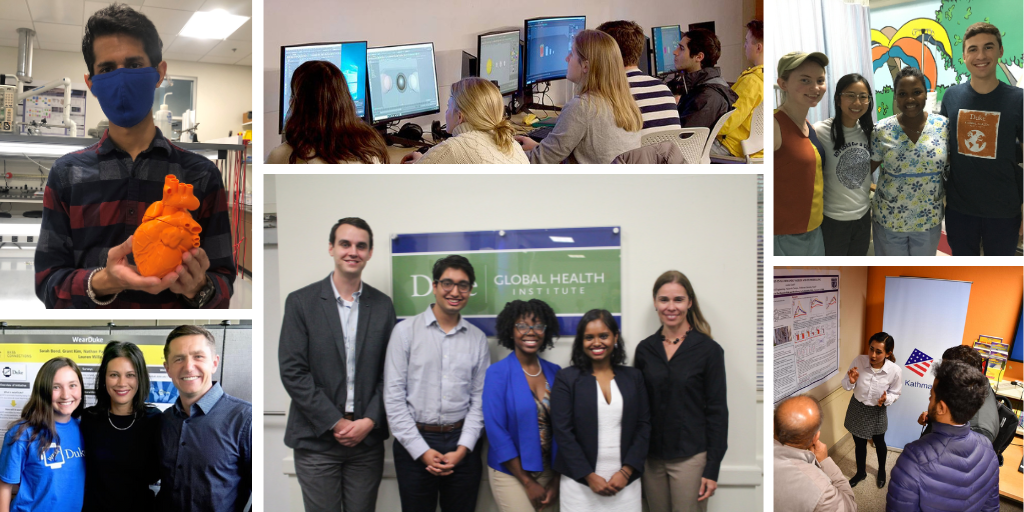Meet the Winners of the 2023 Bass Connections Student Research Awards
April 13, 2023

Five graduate students and 11 undergraduates will pursue faculty-mentored research projects this summer and next year with grant funding from Bass Connections. Their projects explore a diverse range of topics, including the barriers to neurosurgical service delivery in Uganda, how pastors have preached on race and racism in the wake of the killing of George Floyd, how policymakers can increase climate resilience in local communities and more.
Bass Connections Student Research Awards provide support for students to pursue self-directed research projects under the guidance of a faculty mentor. Student projects can be individual or collaborative in nature and may continue an aspect of research begun on a Bass Connections project team or tackle a new interdisciplinary challenge.
Enhancing Neurosurgical Service Delivery in Mbarara, Uganda
Heather Raslan ’25 (Neuroscience), Eugene Cho ’25 (Biology), Isha Shah ’24 (Program II), Morayo Abbey-Bada ’25 (Neuroscience) and Kate Reddy ’25 (Psychology) will expand on the work of the Building Sustainable Neurosurgical Systems in Developing Countries team to explore the barriers faced by neurosurgery providers and patients in Uganda. Uganda is one of many nations facing a high neurosurgical burden as it works to bolster its medical systems. Past research has shed light on some barriers to surgical delivery, but this team will work to gather concrete data about specific barriers to neurosurgical service delivery and utilization in order to inform community-based interventions. Alvan Ukachukwu will serve as their faculty mentor.
Metabolic Impact of Microplastics on Whales Using In Vitro Cell Cultures
Doctoral student Greg Merrill (Ecology) and undergraduates Melanie Chang ’25 (Environmental Engineering) and Jasmine Santos ’24 (Molecular Biosciences) will build on the work of two Bass Connections project teams — Learning from Whales: Oxygen, Ecosystems and Human Health and Bioremediation of Plastic Pollution to Conserve Marine Biodiversity. Merrill’s previous research has shown that microplastics ingested by whales are making their way out of the gut and into other tissues and organs. To better understand the importance of this movement, the team will expose whale fibroblast and adipocyte cells to microplastic particles in vitro and evaluate different metabolic functions at the cellular and genetic levels. Jason Somarelli will serve as their faculty mentor.
Pastor Responses to Police Violence and Racism: A Supervised Text Analysis
Doctoral student Trent Ollerenshaw (Political Science) and undergraduate James Liao ’24 (Public Policy) will leverage a longitudinal dataset of sermons given by North Carolina United Methodist pastors in 2020-2021 to better understand pastors’ approaches to addressing racism with their congregations. Many pastors express reluctance about addressing issues they view as “political.” However, in 2020, the killing of George Floyd made issues of race and racism unavoidable. Building on the work of the Politics and Polarization in Mainline Protestant Congregations team, this project will examine whether and how pastors discussed race and racism with their congregations in the months that followed. Christopher Johnston will serve as their faculty mentor.
Policy Preparedness to Empower Communities Toward Climate Resilience
Finnie Zhao ’24 (Economics, Environmental Sciences & Policy) will evaluate the impact of policy decisions on local communities’ ability to withstand the effects of climate change, such as extreme weather events, resource shortages and socioeconomic changes. Zhao will draw on policy case studies to compare different climate resilience policies and decipher key attributes that future policies should incorporate to increase climate resilience in communities. Her research builds on the Exploring Links Among Ecological, Social and Personal Resilience project. Liz DeMattia and Betsy Albright will serve as her faculty mentors.
Soundtracks of Black Presence: Music, Duke and Pan-African Legacies
Doctoral student Damilare Bello (English) will use the historic 1971 Pan-African–USA International Track Meet hosted at Duke University's Wallace Wade Stadium to examine how music forges transnational bonds between Africa and its U.S. Diaspora. Existing research on the meet has been largely limited to sports scholarship. This project will present a different perspective, placing music that Black Durhamites used to welcome African athletes at the center of the narrative to examine the broader history of Black cultural connections. This work builds on themes Bello explored as the graduate mentor of the 2022 Story+ team From Stephen to C.B.: Tobacco, Race and Duke Men's Basketball. Tsitsi Jaji will serve as his faculty mentor.
Understanding How a Small Invertebrate Grazer Affects Fungal Infection
Doctoral student Anjali Boyd (Marine Science & Conservation) and undergraduates Nhu Bui ’24 (Environmental Science & Policy) and Erika Berlik ’24 (Marine Science & Conservation, Biology) will test whether small invertebrate grazers — particularly snails — facilitate fungal infection and disease in seagrass systems. The team will also examine the impacts on seagrass ecosystem services (i.e., carbon storage and fisheries biodiversity). The team's work has the potential to inform the development of novel low-cost techniques to improve global seagrass restoration and management practices. Brian Silliman will serve as their faculty mentor.
Understanding Rural Mainers' Attitudes Toward the Internet and Broadband
Master’s student Micaela Simeone (Bioethics & Science Policy) will use in-depth, in-person interviews to explore how rural Maine residents feel about the Internet and broadband. Although local broadband initiatives in Maine are increasingly driving solutions shaped by the values, priorities and needs of their communities, many rural Maine community leaders still struggle to garner resident support for broadband expansion. As Maine policymakers continue to focus on closing the digital divide, Simeone’s work is designed to help policymakers consider how resident hesitancy, skepticism and other attitudes around the Internet and broadband may impact adoption and use now and in the future. Her research will build off work done by the Social Provision of Information for Effective Democratic Citizens team. Phil Napoli will serve as her faculty mentor.
Learn More
- Join us at the 2023 Fortin Foundation Bass Connections Showcase on April 19.
- Read about last year’s winners of the Bass Connections Student Research Award.
- Find out what students have to say about their Bass Connections experience.
